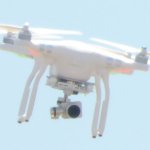VILLAS – Lower Township resident and Herald employee Lisa Murphy was walking along the Delaware Bay, in Villas, March 26, when she spotted over 20 dead birds, mainly robins.
“On Sunday, I was walking the dogs on the bay around 10:30–11 a.m., and all of a sudden I saw a dead bird, but I really thought nothing of it,” Murphy said. “Then, about five steps further, I saw another dead bird.”
Murphy said by the fifth block she had passed about a dozen dead robins. Because her dogs were interested in the dead birds, she turned around to head the other way and spotted several dead robins in the other direction from her starting point between Sandalwood and Wildwood avenues. Murphy then decided to take the dogs home and go collect the birds, fearing there was something wrong.
“The dogs were picking them up, and I was worried they would be getting sick, so I went home and looked up who you call when you find a multitude of birds,” she said.
Murphy then went through an alphabet soup of governmental agencies – the U.S. Environmental Protection Agency (EPA), U.S. Department of Agriculture (USDA), New Jersey Fish and Wildlife, Cape May County Health Department and Cape May County Department of Mosquito Control.
Murphy was advised, somewhat erroneously, that the county Mosquito Control people were interested in dead birds that people find on their property.
When West Nile Virus was a concern in the 2000s, the former Mosquito Commission was asking people to place dead birds in a plastic bag, stick them in the freezer and call them. Someone would then come out and get the bird for testing. One of the key differences between then and now is this is not yet mosquito season.
“Mosquito control said they didn’t handle birds,” Murphy said.
She said since she was trying to find out about birds, she called the Cape May Point Bird Observatory.
“I spoke to them (March 27). They were the most helpful and gave me information, but as far as collecting, etc., it’s not their area,” Murphy said.
She said the county Health Department said they were going to send someone out, but it has not been verified that they ever did.
When the Herald asked about it, the county Public Information Office sent a reply saying, “My understanding is the matter you called about is already in the process of being handled.”
When asked for assistance, the state Department of Environmental Protection (DEP) press officer replied, “We are aware of this, but you should reach out to the USDA as the lead.”
Murphy said the USDA responded to her call and was told someone would come out and pick up the birds sometime March 30.
Tanya Espinosa, public affairs specialist for the USDA-Animal and Plant Health Inspection Service (APHIS), told the Herald, “A resident reached out to our local office and let us know about the birds. We will be collecting the birds and sending one for Highly Pathogenic Avian Influenza (HPAI) testing and coordinate with (New Jersey Fish and Wildlife) on testing for toxicants/pesticide exposure. At this time, that is all the information that we have.”
Murphy confirmed that a woman from the USDA did pick up the birds March 30.
Espinosa directed citizens finding a wild bird kill – the death of a large number of birds at one time – to report the kill to the USDA by calling 1-866-4-USDA-WS or 1-866-487-3297.
When disposing of dead wild birds, the USDA recommends wearing disposable gloves or a plastic bag turned inside out to pick it up. The USDA site says to double bag the carcass and throw it away in your regular trash.
According to the Centers for Disease Control and Prevention, handling HPAI-infected birds is unlikely to lead to illness in people. However, you should seek medical attention if you experience any influenza-like symptoms or illness within 10 days of handling sick or dead birds.
Because HPAI spreads easily on contaminated surfaces, be sure to wash your clothing in hot water and disinfect your shoes after handling a dead wild bird. To disinfect your shoes, use one of the methods below:
- Prepare a solution of one part bleach to 10 parts water and submerge shoes in the solution for 10 minutes. The mixed solution is good for seven days.
- Spray your shoes with a benzalkonium chloride-based commercial disinfectant (such as Lysol spray or a similar product) and allow them to dry.
To learn more about HPAI or view a list of affected states and bird species, go to aphis.usda.gov and search “HPAI.” To learn more about HPAI and human health, go to cdc.gov/flu/avianflu.
Contact the author, Christopher South, at csouth@cmcherald.com or 609-886-8600, ext. 128.








